This question is related a question I previously asked here
Solving integro-differential equation with boundary condition at infinity
and for which a solution was found . Now I am dealing with a similar problem with different parameters and I can't get a solution although the asymptotic condition is satisfied. The differential equation contains a complicated integral and has to be solved with a shooting method since we have boundary conditions at infinity:s[0]=0 and s[end]=1.
I have 2 different sets of parameters and I'm using the code provided in the topic linked above to get the solution
(*Set 1*)
\[Chi] = Rationalize[3.5, 0]
A = Rationalize[1.6, 0];
a = Rationalize[1.9123, 0];
b = Rationalize[-28.9815, 0];
d = Rationalize[9.5, 0];
n = Rationalize[1, 0]
B = Rationalize[1, 0]
(*Set 2*)
\[Chi] = Rationalize[0.548337, 0]
A = Rationalize[1.1809307701602592, 0];
a = Rationalize[14.593441928706284, 0];
b = Rationalize[-23.834284974146534, 0];
d = Rationalize[5.677752578949083, 0];
n = 0;
(*B is useless*)
(*Set 3*)
χ = Rationalize[0.2, 0];
A = Rationalize[3.915543336008174, 0];
a = Rationalize[181.22232071532673, 0];
b = Rationalize[124.88322492316286, 0];
d = Rationalize[-105.81583286477883, 0];
n = Rationalize[0.06779142517329072, 0];
B = Rationalize[0.479615329820981, 0];
end = 20;
I am using a code slightly modified from the one given by @bbgodfrey in the link given above
end=12;
eps=10^-5;
j[x_, r_] = 2 A^2 r x;
g0[x_, r_] = a + b/2 + 3 d/4 + A^2 (b + d) (x^2 + r^2) + d A^4 ((x^2 + r^2)^2 + 4 x^2 r^2);
g1[x_, r_] = j[x, r] (b + 2 d) + 4 d A^4 r x (r^2 + x^2);
jb[x_, r_] = 2 B^2 r x;
g0b[x_, r_] = n
s[0][x_] = x/Sqrt[x^2 + 1/4];
FNB[0] = Interpolation@Rationalize[Table[{r,2 (Pi)^(3/2)/ A E^(-A^2 (r^2)) NIntegrate[(x s[0][x]^2 E^(-A^2 x^2) (g0[x, r] BesselI[0, j[x, r]] -
g1[x, r] BesselI[1, j[x, r]])), {x, 0, 30}] + 2 (Pi)^(3/2)/B E^(-B^2 (r^2)) NIntegrate[(x s[0][x]^2 E^(-B^2 x^2) (g0b[x, r] BesselI[0, jb[x, r]])), {x, 0, 30}]}, {r, 0, end, .1}], 0];
mmin = 1; mmax = 15; imax = 200; wp = 75;
Row[{Dynamic[m], " ", ProgressIndicator[Dynamic[ip], {0, imax}], " ", ProgressIndicator[Dynamic[rm], {0, end}]}]
Do[eqnNB = u''[r] + u'[r]/r - u[r]/r^2 + u[r] - \[Chi]*u[r]^5 -
u[r] (FNB[m - 1][r] + FNB[Max[m - 2, 0]][r])/2 == 0;
sp = ParametricNDSolveValue[{eqnNB, u[eps] == 0, u'[eps] == up0,
WhenEvent[u[r] > 12/10, {bool = 1, "StopIntegration"}],
WhenEvent[{u[r] < 8/10, u[r] < 0}, {bool = 0,"StopIntegration"}]}, u, {r, eps, end + 1}, {up0, wp0},
WorkingPrecision -> wp0, Method -> "StiffnessSwitching",Method -> {"ParametricSensitivity" -> None}, MaxSteps -> 100000];
bl = 1; bu = 10;
Do[bool = -1; bmiddle = (bl + bu)/2; st = sp[bmiddle, wp];
rm = st["Domain"][[1, 2]];
If[bool == 0, bl = bmiddle, bu = bmiddle]; ip = i;
If[bool == -1, Return[]], {i, imax}];
s[m] = st; N[bmiddle, wp];
FNB[m] = Interpolation@Rationalize[Table[{r,2 (Pi)^(3/2)/A E^(-A^2 (r^2)) NIntegrate[(x Piecewise[{{s[m][x],
eps < x < end}},
s[0][x]]^2 E^(-A^2 (x^2)) (g0[x, r] BesselI[0, j[x, r]] -
g1[x, r] BesselI[1, j[x, r]])), {x, 0, 30}] +
2 (Pi)^(3/2)/
B E^(-B^2 (r^2)) NIntegrate[(x Piecewise[{{s[m][x],
eps < x < end}},
s[0][x]]^2 E^(-B^2 x^2) (g0b[x, r] BesselI[0,
jb[x, r]])), {x, 0, 30}]}, {r, 0, end, .1}], 0];, {m,mmin,mmax}]
Plot[Evaluate@Table[s[m][r], {m, mmax - 5, mmax}], {r, eps, end},PlotRange -> All, AxesLabel -> {r, u}, ImageSize -> Large, LabelStyle -> {Black, Bold, Medium}]
Plot[Evaluate@Table[FNB[m][r], {m, mmax - 5, mmax}], {r, 0, end},PlotRange -> All, AxesLabel -> {r, "FNB"}, ImageSize -> Large,LabelStyle -> {Black, Bold, Medium}]
Plot[Evaluate@Table[s[m][r]^2, {m, mmax - 5, mmax}], {r, 0.01, end}, PlotRange -> All, AxesLabel -> {"r", "n(r)"}, ImageSize -> Large,
AxesStyle -> Directive[Black, FontSize -> 17,FontFamily -> "TeX Gyre Pagella Math"], LabelStyle -> Directive[Black, FontSize -> 17, FontFamily -> "TeX Gyre Pagella Math"], ImageSize -> {Large}, PlotRange -> All]
For Set 2 integration gets stuck at the first iteration, probably due to divergence, while for Set 1 integration gets stuck at iteration m=4 and i really don't know why: the previous iteration was going on well and fast and were appearing oscillation in the solution that I expect as in the previous case. Here's a picture of how the solution should be (solid line) 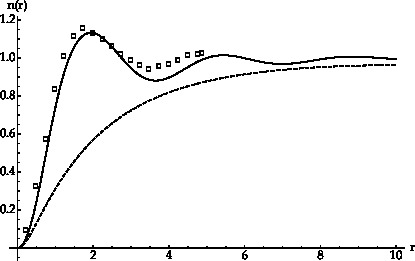

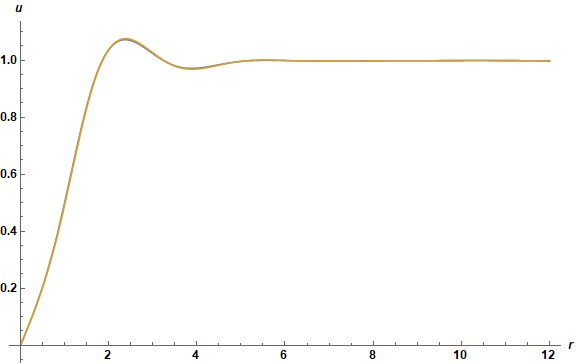
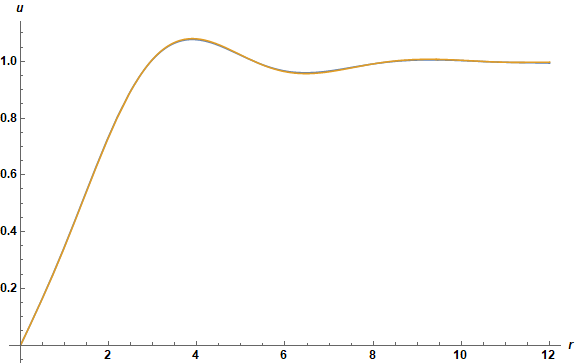
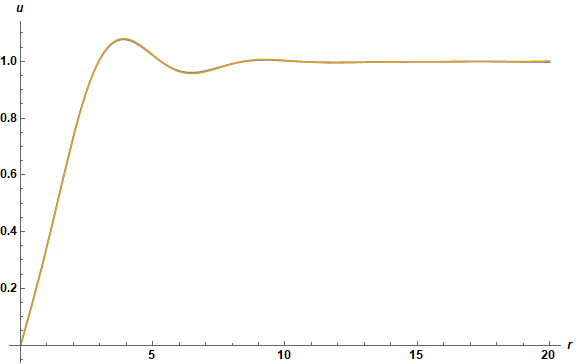
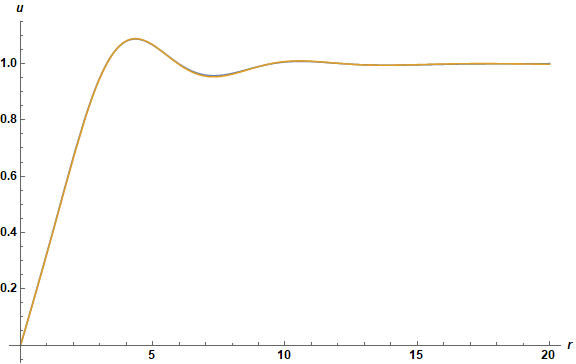
g1[x, r], j[x, r], g0b[x, r], jb[x, r]$\endgroup$Bin Set 2? $\endgroup$n=0as inSet 2the functionsg0bandjbare zero and so is the expression involvingBin the integralFNB. $\endgroup$